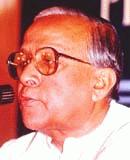The Rediff SpecialSurabhi Banerjee
Many of the Central Committee
members had come to the meetings determined not to let Basu become
prime minister because of personal rivalry and ideological differences
 In May last year, Jyoti Basu, West Bengal's chief minister
and one of the most respected politicians in this country, was
on the verge of becoming India's first Communist prime minister.
The United Front wanted him as its leader, but Basu's own party
-- the Communist Party of India-Marxist -- would
not allow him to be sworn in as prime minister.
In May last year, Jyoti Basu, West Bengal's chief minister
and one of the most respected politicians in this country, was
on the verge of becoming India's first Communist prime minister.
The United Front wanted him as its leader, but Basu's own party
-- the Communist Party of India-Marxist -- would
not allow him to be sworn in as prime minister.
In this extract from
Basu's recent biography, Surabhi Banerjee reveals what really happened.
A controversial decision that continues to convulse the CPI-M
V P Singh said publicly, 'Jyoti Basu is a towering figure in India's
public life, a man who has proved his skill at consensus-building
by leading a state-level coalition five times into power.'
The general feeling following the Central Committee's decision -- and
this was borne out by conversations this writer had with several
party members and other political analysts -- was that it was the
age-old internal divisions within the party, and not the national
interest that decided the issue. Many of the Central Committee
members had come to the meetings determined not to let Basu become
prime minister because of personal rivalry and ideological differences.
The morning after his return to Calcutta, Basu had a brief meeting
with the chief secretary on the swearing-in ceremony of the state
government that would take place on May 20. He glanced through
the list of state invitees. Congratulations poured in all day
from home and abroad on his returning to power in West Bengal,
but there were also expressions of disappointment at his not being
chosen the prime minister. He was unemotional in his response
to both kinds of messages.
He visited the party office in the
evening, met his comrades, and behaved normally, though it was
obvious that he was not in good spirits. He analysed with his
colleagues the results of the elections and worked on the agenda
of the state committee meeting scheduled to be held on May 17.
The next morning, he attended the meeting of the secretariat and
discussed the appointments and portfolios of ministers in the
new government.
The effect of his time in Delhi continued to
subdue his mood; he was now starting to tire of providing explanations.
Referring to the enquires he says, 'They don't understand one
simple thing, I can't take a personal decision even if I wish
to join the government. The majority in the party decided not
to join. I had to accept the verdict.'
By the time the swearing-in of the West Bengal ministry took place
on May 20, he was much happier. It was obvious that the Delhi
debacle was receding from his mind. And then, on May 21, he received
a message from the United Front in Delhi saying his presence was
required in Delhi for the formation of a steering committee to
advise the new government. Delhi detained him for a few days but
he was back in Calcutta on the 24th, and presided over his first
cabinet meeting on May 28.
In the following weeks, he was asked
to be in Delhi frequently as the central cabinet tried to settle
down, until he asked them to be a bit more practical. ''How can
I commute between Delhi and West Bengal so frequently?'' he asked
and requested the Front to keep him out of as many of the committees
as they could.
The press continued to comment on the CPI-M's decision not to
participate in the coalition at the Centre. The Front leaders
and the other members of the Front expected that the CPI-M would
reverse its decision and relent especially as the CPI had decided
to join the coalition in the first week of June. The chief minister
of Bihar, Laloo Prasad Yadav, said in Patna, 'They (the CPI-M)
are taking a decision and will join the government within a month.'
Even V P Singh was confident that the CPI-M would soon join the
Deve Gowda government.
Welcoming the move of the CPI, he hoped
that the CPI-M would follow suit. The Andhra Pradesh chief minister,
Chandrababu Naidu, similarly urged them to join the government.
'The CPI-M leaders have worked hard to bring secular parties
on a common platform and should reconsider their decision. The
TDP also favours joining the government,' he said in Hyderabad.
Newspaper editorials suggested the same, feeling that the CPI
move offered the CPI-M a fresh opportunity to make up for its earlier
bungling and call the shots in national politics.
At this time it became clear that a view was being put out by
a section of the CPI-M that Basu had been a willing party to
the decision by the Central Committee and the Politburo to refrain
from joining the United Front government. Basu did not react to
the opinion being bandied about.
Excerpted from Jyoti Basu, by Surabhi Banerjee, Viking, 1997, Rs 400, with
the publisher's permission.
Tell us what you think of this extract
|





